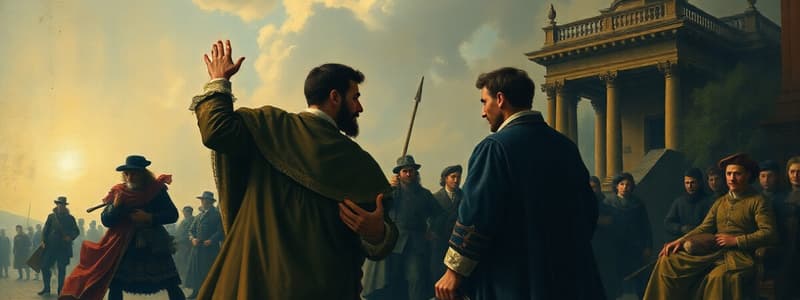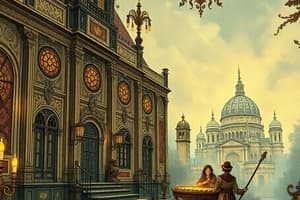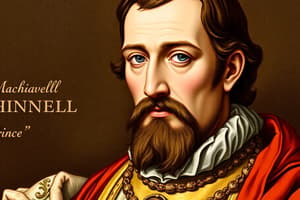Podcast
Questions and Answers
What was the primary concern for Machiavelli when he wrote about princes?
What was the primary concern for Machiavelli when he wrote about princes?
- To ensure a prince stays in power (correct)
- To promote the idea of absolute monarchy
- To advocate for democratic governance
- To eliminate the influence of the church
According to Machiavelli, what is preferable for a ruler when it comes to the feelings of the people?
According to Machiavelli, what is preferable for a ruler when it comes to the feelings of the people?
- To strictly avoid fear among the people
- To possess both love and fear in equal measure
- To be loved above all else
- To be feared if a choice must be made (correct)
Which family did Machiavelli frequently reference as an example of rulers who did not keep their promises?
Which family did Machiavelli frequently reference as an example of rulers who did not keep their promises?
- The Viscontis
- The Medicis
- The Sforzas
- The Borgias (correct)
How has Machiavelli's reputation been characterized over time?
How has Machiavelli's reputation been characterized over time?
What was one of the criticisms of Machiavelli's view on human nature?
What was one of the criticisms of Machiavelli's view on human nature?
What was Cesare Borgia's strategy when attempting to conquer Camerino?
What was Cesare Borgia's strategy when attempting to conquer Camerino?
How did Machiavelli perceive Cesare Borgia's military skills?
How did Machiavelli perceive Cesare Borgia's military skills?
What was a key characteristic of Alexander VI's promises, according to Machiavelli?
What was a key characteristic of Alexander VI's promises, according to Machiavelli?
What ultimately happened to Cesare Borgia after the death of Pope Alexander VI?
What ultimately happened to Cesare Borgia after the death of Pope Alexander VI?
What action did Cesare Borgia take after obtaining the trust of the rulers of Camerino?
What action did Cesare Borgia take after obtaining the trust of the rulers of Camerino?
Flashcards
Machiavelli's Theory of Fear and Love
Machiavelli's Theory of Fear and Love
The idea that a ruler should be both loved and feared by their people. It's better to be feared than loved. However, if a ruler could achieve both, that would ideal.
The Prince
The Prince
A book written by Niccolò Machiavelli which discusses the best way to rule and manage a principality and stay in power. It advocates for practicality and power politics.
Machiavellian
Machiavellian
Someone who is crafty, manipulative and power-hungry. They will use any means to achieve their goals. Machiavelli was often criticized for his cynical views on human nature and leadership.
The Borgia Family
The Borgia Family
Signup and view all the flashcards
Pessimist about Human Nature
Pessimist about Human Nature
Signup and view all the flashcards
Who was Cesare Borgia?
Who was Cesare Borgia?
Signup and view all the flashcards
What was Cesare Borgia's tactic to take over Urbino?
What was Cesare Borgia's tactic to take over Urbino?
Signup and view all the flashcards
What was Alexander VI's character according to Machiavelli?
What was Alexander VI's character according to Machiavelli?
Signup and view all the flashcards
What was Cesare Borgia known for besides his ruthlessness?
What was Cesare Borgia known for besides his ruthlessness?
Signup and view all the flashcards
What happened to the Borgia family in the end?
What happened to the Borgia family in the end?
Signup and view all the flashcards
Study Notes
Machiavelli's The Prince
- Machiavelli, a Florentine government official in the late 1400s, observed Italy's tumultuous political landscape.
- He witnessed the struggles between city-states, foreign powers, and the Papacy, leading him to analyze political power dynamics.
- Machiavelli's The Prince analyzed political strategy, causing considerable discussion.
- The central goal of a ruler, according to Machiavelli, is maintaining power.
Maintaining Power
- Machiavelli believed a ruler might require dishonesty to maintain power.
- Quote: "A wise leader cannot and should not keep his word when keeping it is not to his advantage."
- Machiavelli proposed that while a ruler might prefer both love and fear, fear alone, as a necessary evil, was the better choice.
Machiavelli's Reputation
- Machiavelli's ideas faced misinterpretations, leading to a negative reputation, associating his name with cunning, deceit, and ambition.
- The modern usage of "Machiavellian" describes someone manipulative and power-hungry.
Alternative Interpretations of Machiavelli
- Some argue Machiavelli accurately depicted political realities rather than presenting ideal behavior.
- Machiavelli's writings might be considered a realistic portrayal of governing challenges in a complex world, rather than an endorsement of immoral actions.
- Some scholars view Machiavelli as a student of ancient Roman Republic ideals, favoring citizen participation.
The Borgias as Case Studies
- Machiavelli's writing offers insights into the Borgia family, known for their perceived cruelty, violence, and corruption.
- Pope Alexander VI (Rodrigo Borgia) was criticized for his corrupt dealings.
- Cesare Borgia, Rodrigo's son, was a formidable military leader, noted for his ruthless acquisition of power.
- Machiavelli was impressed by Cesare's military prowess, though he also witnessed Cesare's ruthless methods.
- Example: Cesare's deception of the Duke of Urbino and subsequent betrayal of Camerino.
- Cesare's methods illustrate the challenges of power and acquisition.
Borgia Dynasty's Downfall
- The Borgias lost their power relatively quickly.
- Pope Alexander VI died in 1503.
- Cesare Borgia was expelled from Italy and died in battle.
Studying That Suits You
Use AI to generate personalized quizzes and flashcards to suit your learning preferences.




